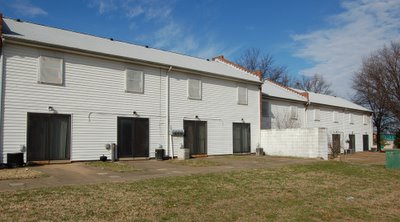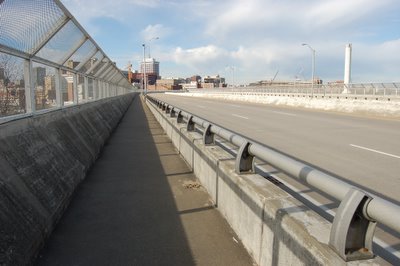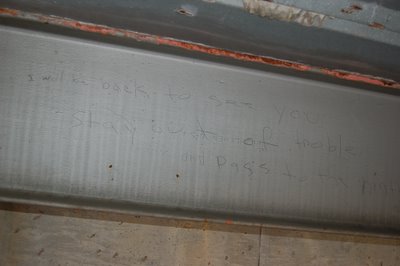Martin Luther King Jr. day part II

The Civil Rights movement, the anti-vietnam war movement, and militant workers struggles were threatened american capitalism in the 1960's. That they remained seperate struggles was critical, and the democratic party was used yet again to bring leftward tendencies back into the framework of bourgeois politics. Suppressing the militant struggles of nearly the entire working class and youth, though, was not just a matter of channeling their politics back into the useless flow of american democracy; concessions needed to be made. Lyndon Johnson, as part of his "great society" reforms, created the Department of Housing and Urban Development to provide low-cost housing. In some of the cities I've seen, many of these projects are already abandoned, boarded up, or demolished. Chicago's 22 massive public housing towers have almost or all been destroyed, because of the immense rate of crime and unemployment in them. Those problems have little to do with the housing, but now the land can be redeveloped for profit.
Here, many of the housing projects are still extent, in various conditions. This neighborhood looked like it was built within the last decade; others seem anywhere from 10-40 years old. Some areas are terribly undermaintained, and downright depressing to look at, owing to the horrendous economic and social situation of this city.
These houses struck me becuase they look quite well maintained, and even new. Yet, even in this condition bars cover the windows and doors, making this look more like a prison than a nice place to live.

Directly across the street from those white houses is this much more standard scene around this city. All four houses here are boarded up, and a fifth out of the picture is currently being gutted. Behind and around these buildings are empty lots, where houses in a similar situation have already been demolished. Such lots create a very confusing landscape in a city: as the city radiates out, one would expect development to gradually get thinner and thinner, with the most dense areas around the center and particulary important cultural and social areas. Instead, heading down a street filled with row houses, one is liable to take a turn and suddenly see a trash strewn, overgrown field, where houses have been destroyed. Sometimes, one or two rowhouses awkwardly remain in this unused open space.
Why so many abandoned houses? In part three of these posts, I quote a fellow I chatted with who demostratively shows the simplist reason: many cannot afford the rent, or mortgage. Why so little money? The economy of the area has been pratically wiped clean of any large scale industrial employment, with only an aluminum plant, and a few small paper mills/recycling centers. Meanwhile, most of the decent wages are from the financial sector, and that workforce has primarily deserted the city in fear of the social catastrophe that is gradually erupting from the previously mentioned job loss. Daily the evidence of this is provided, here is the intake I got on Martin Luther King jr. day:
A hallmate : “I’m not going to go running! I want to live! Not in Richmond man.”
Later, I'm riding my bike, a kid my age say's he should throw a rock at me, and then ask's his friend if he has one.
Soon afterwards, I get asked for the third time that day, in just as many places, if I have any money. I help out a little, and start talking to this guy. I tell him about those kids saying they'd throw a rock at me, he replies: "I got rocks thrown at me by some a those kids. I tried to get a brick and chuck in back, and then a cop says 'don’t you throw that brick!' Man, if their throwing rocks at me, I better be able to throw back!”
With this outmoded social system and it's devastating effects, hopeless discontent finds it's easiest path in doing things like throwing a brick at a homeless man or a student.

I feel like I find a disproportionate amount of irony of photo expeditions. Expert movers? Wouldn't expert movers want their trailer back so they can expertly move something else? Also, when something is moved, simply moving it to the moving device itself is generally a transitional step in the moving process...

This highway bridge starts next to the housing project pictured at the top of this post. It's really a quite remarkable bridge, as it seems a half-mile long, is 6 lanes wide, and is an elongated S-shape. Even more remarkable is that while I've wanted to illustrate the lack of traffic on the bridge, that wasn't in my mind when I took this shot, but regardless of my intentions the picture has no cars in it! Even though you have to jump a railing, cross that center barrier, and jump another railing to see the other side, I easily did that too, because roads can't be very dangerous cross without the critical aspect of traffic.
The lack of traffic is attributable to the previously mentioned exodus of those working in higher-income occupations to outlying suburban areas, where they need not fear, as a real example, nine people being murdered in the week after New Years. So, most of the day, and all of the night, this bridge is almost serene. At rush hours though, it's actually sometimes got cars in all 6 lanes... but just rush hour.

Nearby the above depicted bridge is another shorter, lower one lane highway bridge, and this is written on one girders that supports it. The area under the end of highway bridges is used by many homeless as shelter. This one was two small and out of the way for that, I suppose, but people had obviously visited, and this even seems to have been a meeting between father and son. It says: "I'll be back to see you stay out of trouble and pass on to the 9th grade" Another message, dated from 1985, says something similar too.
This really begs alot of questions- why is the writer leaving? Why does this meeting have to be in such a hidden place? Who wrote this? Did his (son?) even see it?
Just from that one sentence, alot is revealed. Apparantely, in the richest nation of the world, passing on to the last third of school, or merely the second half if you include college, is still not an absolute, and likely far from it.

0 Comments:
Post a Comment
<< Home